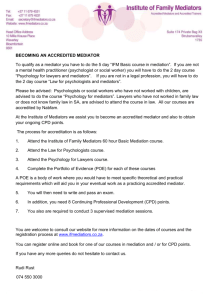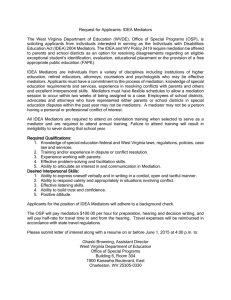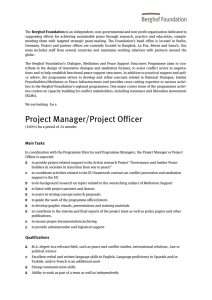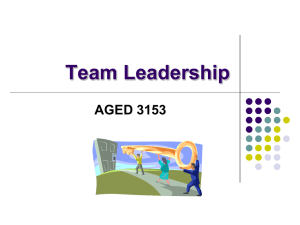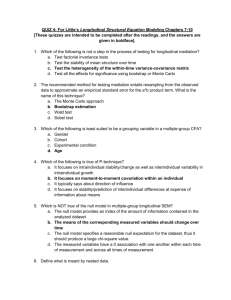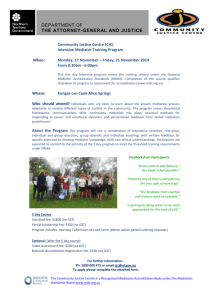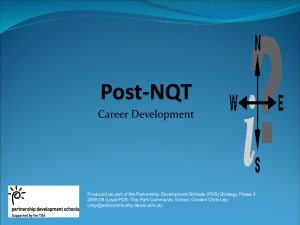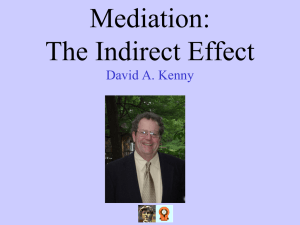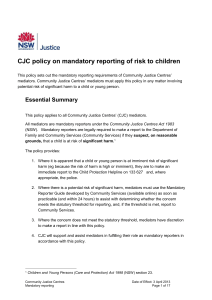Practice alert - Community Justice Centres
advertisement
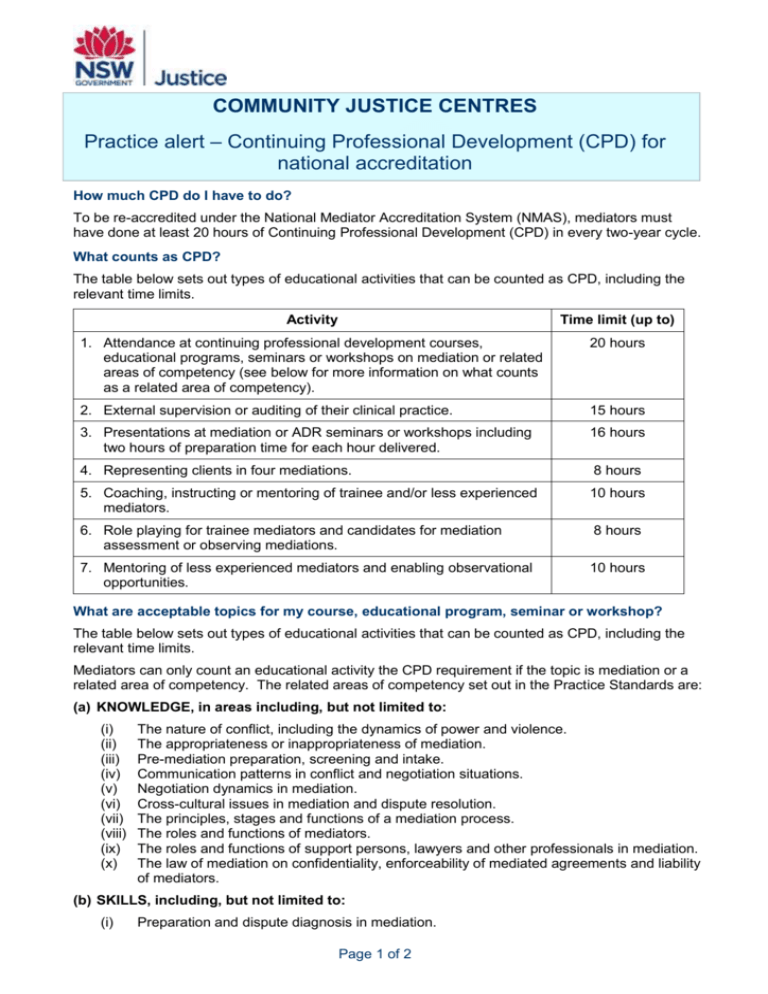
COMMUNITY JUSTICE CENTRES Practice alert – Continuing Professional Development (CPD) for national accreditation How much CPD do I have to do? To be re-accredited under the National Mediator Accreditation System (NMAS), mediators must have done at least 20 hours of Continuing Professional Development (CPD) in every two-year cycle. What counts as CPD? The table below sets out types of educational activities that can be counted as CPD, including the relevant time limits. Activity Time limit (up to) 1. Attendance at continuing professional development courses, educational programs, seminars or workshops on mediation or related areas of competency (see below for more information on what counts as a related area of competency). 20 hours 2. External supervision or auditing of their clinical practice. 15 hours 3. Presentations at mediation or ADR seminars or workshops including two hours of preparation time for each hour delivered. 16 hours 4. Representing clients in four mediations. 8 hours 5. Coaching, instructing or mentoring of trainee and/or less experienced mediators. 10 hours 6. Role playing for trainee mediators and candidates for mediation assessment or observing mediations. 8 hours 7. Mentoring of less experienced mediators and enabling observational opportunities. 10 hours What are acceptable topics for my course, educational program, seminar or workshop? The table below sets out types of educational activities that can be counted as CPD, including the relevant time limits. Mediators can only count an educational activity the CPD requirement if the topic is mediation or a related area of competency. The related areas of competency set out in the Practice Standards are: (a) KNOWLEDGE, in areas including, but not limited to: (i) (ii) (iii) (iv) (v) (vi) (vii) (viii) (ix) (x) The nature of conflict, including the dynamics of power and violence. The appropriateness or inappropriateness of mediation. Pre-mediation preparation, screening and intake. Communication patterns in conflict and negotiation situations. Negotiation dynamics in mediation. Cross-cultural issues in mediation and dispute resolution. The principles, stages and functions of a mediation process. The roles and functions of mediators. The roles and functions of support persons, lawyers and other professionals in mediation. The law of mediation on confidentiality, enforceability of mediated agreements and liability of mediators. (b) SKILLS, including, but not limited to: (i) Preparation and dispute diagnosis in mediation. Page 1 of 2 (ii) (iii) (iv) Intake and screening of both the parties and the dispute to assess suitability for mediation. Conduct and management of the mediation process. Appropriate communication skills, including listening, questioning, reflecting and summarising, required for the conduct of mediation. (v) Negotiation techniques and the mediator’s role in facilitating negotiation and problemsolving. (vi) Mediator interventions appropriate for standard difficulties in mediation. (vii) Potential responses to high emotion, power imbalances and violence. (viii) Use of separate meetings and shuttle mediation. (ix) Asking questions about or in appropriate circumstances, drafting of mediated agreements. (c) ETHICAL UNDERSTANDINGS in relation to: (i) (ii) (iii) (iv) (v) (vi) (vii) The avoidance of conflicts of interest. Marketing and advertising of mediation. Confidentiality, privacy and reporting obligations. Neutrality and impartiality. Fiduciary obligations. Supporting fairness and equity in mediation. Withdrawal from and termination of the mediation process. What CJC activities count towards CPD? Mediator Advisory Forums (MAF meetings) may count towards your CPD to the extent they cover matters relating to mediation or related skill areas as referred to in the competencies above. The following CJC activities can also count for a total of up to 10 hours of CPD (ie not 10 hours each): Mentoring a new CJC mediator in a mentored mediation session. Reflection sessions. How do I access CPD? CJC is not obliged to provide CPD to its mediators. However, CJC makes every effort to help CJC mediators access DAGJ’s internal courses and to suggest relevant external courses. From time to time CJC may also deliver training to CJC mediators. Mediators who live in a rural or remote area (i.e outside Sydney, Wollongong, Central Coast, Canberra or Newcastle metropolitan areas) may count hours spent listening to podcasts on mediation or related areas of competency. These are available from various websites. If you have questions about what counts as CPD, please contact the Practice Manager. What records must I keep? Mediators are responsible for keeping records, which may be audited at any time, as evidence they have fulfilled the CPD requirements. CJC cannot assist mediators to record or calculate CPD hours. Where can I get more information? The information in this Practice Alert is taken from the Approval Standards and the Practice Standards that apply under the NMAS. See http://www.msb.org.au/mediator-standards/standards How to contact us If you would like more information or have any questions please contact us on: Freecall: 1800 990 777 Fax: (02) 8688 9616 Email: cjc_sydney@agd.nsw.gov.au If you are deaf or have a hearing impairment or speech impairment, contact us through the National Relay Service on 1800 555 677 and ask for 1800 990 777. Page 2 of 2 © State of New South Wales through the Department of Justice 2014. You may freely deal with this work for any purpose, other than for profit. This document was prepared in August 2011 by the department for general information purposes.
